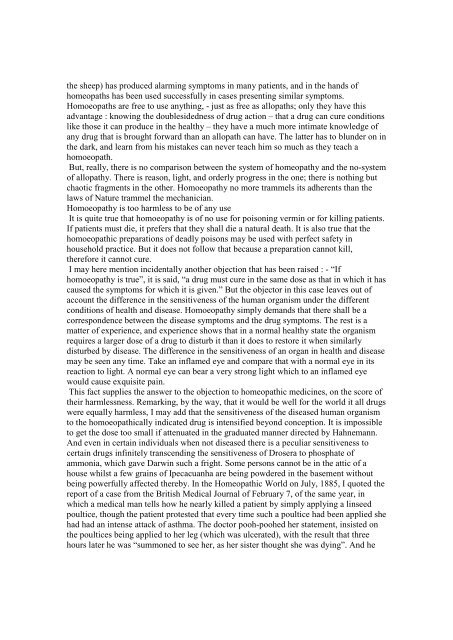CLARKE JH, Homoeopathy Explained - Classical Homeopathy Online
CLARKE JH, Homoeopathy Explained - Classical Homeopathy Online
CLARKE JH, Homoeopathy Explained - Classical Homeopathy Online
You also want an ePaper? Increase the reach of your titles
YUMPU automatically turns print PDFs into web optimized ePapers that Google loves.
the sheep) has produced alarming symptoms in many patients, and in the hands of<br />
homeopaths has been used successfully in cases presenting similar symptoms.<br />
Homoeopaths are free to use anything, - just as free as allopaths; only they have this<br />
advantage : knowing the doublesidedness of drug action – that a drug can cure conditions<br />
like those it can produce in the healthy – they have a much more intimate knowledge of<br />
any drug that is brought forward than an allopath can have. The latter has to blunder on in<br />
the dark, and learn from his mistakes can never teach him so much as they teach a<br />
homoeopath.<br />
But, really, there is no comparison between the system of homeopathy and the no-system<br />
of allopathy. There is reason, light, and orderly progress in the one; there is nothing but<br />
chaotic fragments in the other. <strong>Homoeopathy</strong> no more trammels its adherents than the<br />
laws of Nature trammel the mechanician.<br />
<strong>Homoeopathy</strong> is too harmless to be of any use<br />
It is quite true that homoeopathy is of no use for poisoning vermin or for killing patients.<br />
If patients must die, it prefers that they shall die a natural death. It is also true that the<br />
homoeopathic preparations of deadly poisons may be used with perfect safety in<br />
household practice. But it does not follow that because a preparation cannot kill,<br />
therefore it cannot cure.<br />
I may here mention incidentally another objection that has been raised : - “If<br />
homoeopathy is true”, it is said, “a drug must cure in the same dose as that in which it has<br />
caused the symptoms for which it is given.” But the objector in this case leaves out of<br />
account the difference in the sensitiveness of the human organism under the different<br />
conditions of health and disease. <strong>Homoeopathy</strong> simply demands that there shall be a<br />
correspondence between the disease symptoms and the drug symptoms. The rest is a<br />
matter of experience, and experience shows that in a normal healthy state the organism<br />
requires a larger dose of a drug to disturb it than it does to restore it when similarly<br />
disturbed by disease. The difference in the sensitiveness of an organ in health and disease<br />
may be seen any time. Take an inflamed eye and compare that with a normal eye in its<br />
reaction to light. A normal eye can bear a very strong light which to an inflamed eye<br />
would cause exquisite pain.<br />
This fact supplies the answer to the objection to homeopathic medicines, on the score of<br />
their harmlessness. Remarking, by the way, that it would be well for the world it all drugs<br />
were equally harmless, I may add that the sensitiveness of the diseased human organism<br />
to the homoeopathically indicated drug is intensified beyond conception. It is impossible<br />
to get the dose too small if attenuated in the graduated manner directed by Hahnemann.<br />
And even in certain individuals when not diseased there is a peculiar sensitiveness to<br />
certain drugs infinitely transcending the sensitiveness of Drosera to phosphate of<br />
ammonia, which gave Darwin such a fright. Some persons cannot be in the attic of a<br />
house whilst a few grains of Ipecacuanha are being powdered in the basement without<br />
being powerfully affected thereby. In the Homeopathic World on July, 1885, I quoted the<br />
report of a case from the British Medical Journal of February 7, of the same year, in<br />
which a medical man tells how he nearly killed a patient by simply applying a linseed<br />
poultice, though the patient protested that every time such a poultice had been applied she<br />
had had an intense attack of asthma. The doctor pooh-poohed her statement, insisted on<br />
the poultices being applied to her leg (which was ulcerated), with the result that three<br />
hours later he was “summoned to see her, as her sister thought she was dying”. And he
















